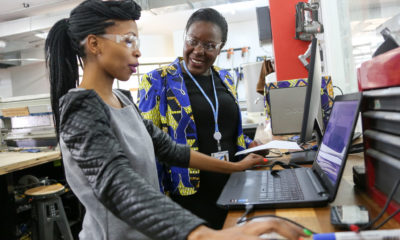In this week’s news roundup, you’ll read about KuCoin’s new report that has revealed that the number of African crypto users increased by 2,500%, Kenya’s central bank has issued a warning on the risks associated with cryptocurrencies, and more.
Report: Number of African Cryptocurrency Users Grew by 2,500% in 2021
A new report by KuCoin has revealed that the number of cryptocurrency users in Africa grew by nearly 2,500% between January 2021 and January 2022. The report also noted that the average number of monthly transactions grew by almost 1,400% within the same period.
 The report comes at the backdrop of increased cryptocurrency usage by many African users as a result of the continent’s growing aptness for embracing new technologies. According to the report, Cairo, Cape Town, and Lagos are the major cities that are powering the digitization process in Africa.
The report comes at the backdrop of increased cryptocurrency usage by many African users as a result of the continent’s growing aptness for embracing new technologies. According to the report, Cairo, Cape Town, and Lagos are the major cities that are powering the digitization process in Africa.
The report also noted a 64% increase in cryptocurrency transactions in Nairobi, Kenya which was higher than in the other regions.
The KuCoin report also suggested that the spurring growth of crypto users in Africa is linked to factors such as exchange rate fluctuations and inflation. Additionally, another factor attributed to the user growth in the continent is linked to the ongoing campaigns to educate the masses about emerging financial technologies. KuCoin, a cryptocurrency exchange, is also involved in efforts to educate the masses.
KuCoin went ahead to assert that about 88.5% of the crypto transactions carried out by African users were in fact cross-border transfers. This, thanks to the low fees paid, makes cryptocurrencies a far more convenient means of moving funds across borders. The crypto exchange also explained in the report how it was working to ensure more people in Africa become knowledgeable about blockchain and cryptocurrencies.
The Central Bank of Kenya Issues a Warning on the Risks of Cryptocurrencies
The Central Bank of Kenya (CBK) via its governor, Patrick Njoroge, has issued a warning to citizens using cryptocurrencies saying it still doesn’t support crypto transactions due to the risks associated with it.
Njoroge went ahead to warn Kenyans to avoid peer-to-peer (P2P) cryptocurrency transactions citing that they aren’t regulated.
Speaking during the World Consumer Rights Celebration Day 2022 that was marked in Mombasa on Tuesday, Njoroge said, “There are people who are excited about cryptocurrencies because they see it as a sort of investment that they can win big because prices are going up quickly, so they believe they would see a huge return for their investment. But I think that is why we say for every person who wins something, there are hundreds who lose.”
He went ahead to warn financial institutions supporting crypto transactions that they risk losing their licenses. The CBK has been issuing crypto warnings to Kenyan banks since 2018. Njoroge further stated that the CBK will only accept such transactions once the crypto space is controlled and proper measures have been put in place to protect the public.
“We are working with other players and regulators around the world to make sure that space is safe,” he said.
Despite the anti-crypto stance taken by the CBK, according to Chainalysis, Kenya leads Africa in crypto adoption and is ranked fifth globally ahead of countries such as China, South Africa, and even the US.
Grammy Award-winning Artist, LeriQ, Launches NFT Platform for African Creators and Secures Funding
Grammy award-winning artist, Eric Utere, popularly known as LeriQ, has announced the launch of African Valuables Collectibles (AVC), a platform designed to help content creators to create and sell non-fungible tokens (NFTs).
AVC was founded in 2020 by Utere, a Nigerian Grammy award-winner, producer, and songwriter. Currently based in Accra and Lagos, the platform has been built to help African creators to create, manage, and sell digital arts and assets through partnerships with global NFT exchanges. The platform is live with artists from Ghana, Nigeria, and South Africa with plans to expand across the African continent. In addition, the platform is designed to enable creators to grow their brands as well as reach global markets via NFT technology.
“There currently exists extremely high barriers to entry for African content creators into the metaverse. AVC aims to assist content creators create and sell digital assets by providing a seamless and frictionless platform. In addition, we also want to educate content creators on the opportunity to sell digital assets like NFTs,” said Utere.
AVC just recently raised an undisclosed amount of funding to enable growth in onboarding creators. The pre-seed funding round saw AVC get funding from Kepple Africa Ventures, Cameron Hejazi (CEO of NFT Platform Cent.co), Ronald Chagoury Jr., and several angel investors.
To learn more about Bitcoin, download the Bitcoin Beginner’s Handbook for free.


 Features3 years ago
Features3 years ago
 Bitcoin2 years ago
Bitcoin2 years ago
 Features3 years ago
Features3 years ago
 Features3 years ago
Features3 years ago
 Features3 years ago
Features3 years ago
 Features3 years ago
Features3 years ago
 Features8 months ago
Features8 months ago
 Bitcoin10 months ago
Bitcoin10 months ago

 The report comes at the backdrop of increased cryptocurrency usage by many African users as a result of the continent’s growing aptness for embracing new technologies. According to the report, Cairo, Cape Town, and Lagos are the major cities that are powering the digitization process in Africa.
The report comes at the backdrop of increased cryptocurrency usage by many African users as a result of the continent’s growing aptness for embracing new technologies. According to the report, Cairo, Cape Town, and Lagos are the major cities that are powering the digitization process in Africa.
















 Central African Republic (CAR) has set up a 15-member committee that will be responsible for developing a bill on the use of cryptocurrencies and tokenization in the region.
Central African Republic (CAR) has set up a 15-member committee that will be responsible for developing a bill on the use of cryptocurrencies and tokenization in the region.
